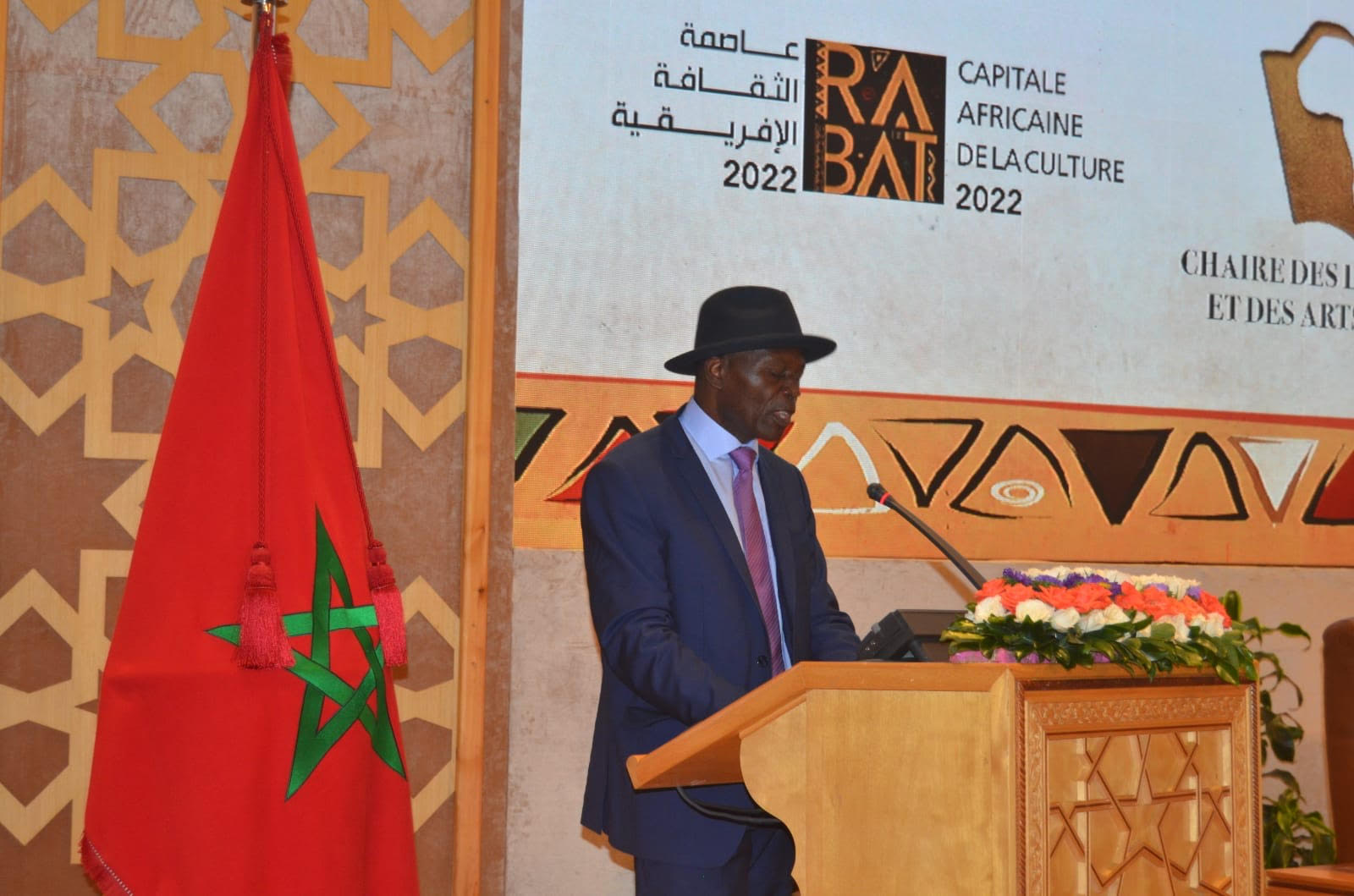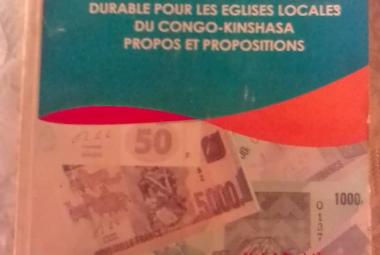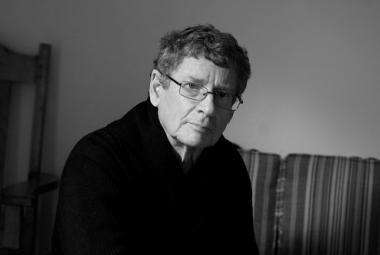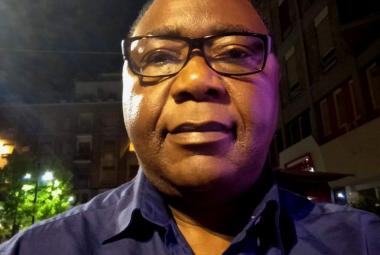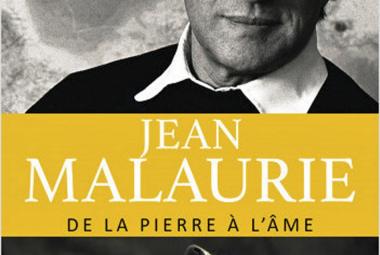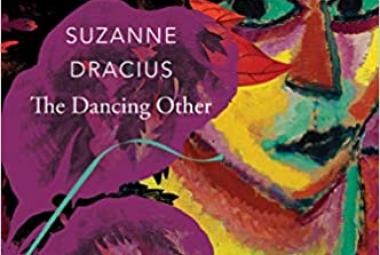Professor of cultural diplomacy at Lansana Conté University in Conakry, Doctor of French and comparative literature (Paul-Valéry University in Montpellier), graduate of CELSA (School of Advanced Studies in Communication Sciences -Ecole des Hautes Etudes en sciences de la communication) and the Institute of Political Studies of Aix-en-Provence (Institut d'Etudes Politiques à Aix-en-Provence), writer, since March 2022 Eugène Ébodé is Administrator of the African literature and arts’chair created in Rabat by Pr Abdeljalil Lahjomri, Permanent Secretary of the Academy of the Kingdom of Morocco. Afrique Destinations invited him for its readers. His eleventh and dizzying novel Habiller le ciel (Gallimard, 2022), is forthcoming on October 6. Interview.
Afrique Destinations: Mr. Eugène Ebodé, all those who are interested in French-language literature know you for the numerous publications that you have to your credit as well as the prizes that have crowned some of your books. But who is Eugène Ebodé for the common reader?
Eugène Ebodé : A Cameroonian, now a Moroccan at heart and a lover of reading and transmission, passionate about multidimensional conversation. I now live and work in Morocco after a long stay in France with a few forays into North America to document, write, teach and travel.
Afrique Destinations: Eugène Ebodé is best known as a writer, journalist or academic. But many don't know that you have a footballing past too. Why didn't you continue your career as a professional?...
Eugène Ebodé: I hated physical preparation and jogging on the sand or running down the stairs. I wrote a novel about football: The Divine Wrath (La divine colère). It is the one that has been sold the least. It is however incredible. More sincerely, my mother put an end to this adventure. I recount it extensively in Dressing the Sky (Habiller le ciel).
Afrique Destinations: You attended the Collège Libermann in Douala, the Lycée Classique in Bafoussam, the Bilingual Lycée in Yaoundé in your country of origin, Cameroon, but you spent seven months at the Lycée Félix Eboué in N'Djamena in Chad. When did you decide to go into literature?
Eugène Ebodé: A little before leaving for Europe. More decisively in France, curiously at the end of my studies at Sciences-po, I switched to letters. The doctorate in this discipline testifies to this. Before that, I have fond memories of the time spent in the science stream during my secondary studies. In higher education, I chose political science studies. With my Masters in Political Science in my pocket, I decided it was time to go home: that of Belles-Lettres.
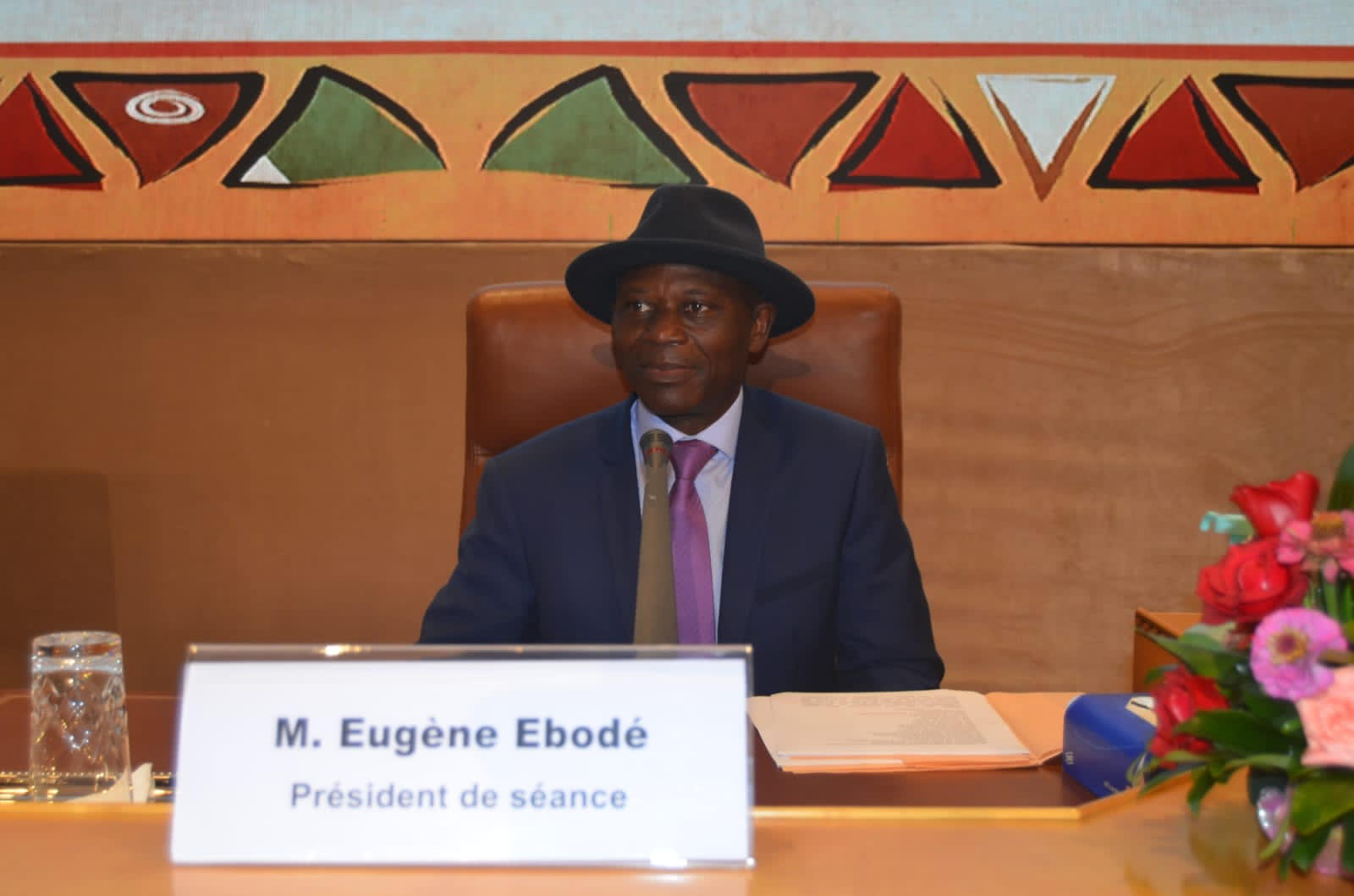
Afrique Destinations: Let's talk briefly about your academic background…After the Baccalaureate, you entered the Panthéon-Sorbonne University, then Sciences-Po. Graduated from the Institut d'Etudes Politiques in 1988, you then hold a DESS in Communication and Public Relations and a Master 2 in Political Science from the University of Montpellier I, a Doctorate in French Literature and compared to Paul-Valéry University, Montpellier III. Is it correct ?
Eugène Ebodé: Everything is true. Above all, since March 2022, I’m the Administrator of African literature and arts’chair created in Rabat by Professor Abdeljalil Lahjomri, Permanent Secretary of the Academy of the Kingdom of Morocco. He is a man of very high intellectual stature, one of whose books, The Morocco of French Hours (Le Maroc des Heures Françaises), is a dazzling and fundamental manual against the clichés and attempts to reduce Africa by the colonizer or by those who do not see it only in the wake of history and never at the forefront. Professor Lahjomri therefore wanted the chair to be a tool for decompartmentalization coupled with a new body for the consecration of African letters and arts. The objective of the chair is entirely in the refutation of the colonial heritage which has segmented African imaginations and literatures according to linguistic, cultural or geographical eras. It is also a question of promoting artistic interactions for the benefit of a better circulation of African imaginations within the continent. This chair has a privileged audience for doctoral students and teacher-researchers and it does not forget the diaspora as an entity of pan-African intellectual rearmament. I am also a Professor of cultural diplomacy at Lansana Conté University in Conakry. The Pan-African map is thus strongly mobilized.
Afrique Destinations: What exactly can Black Africa expect from the Chair of African Literature and Arts of the Academy of the Kingdom of Morocco?
Eugène Ebodé : Decompartmentalising means putting an end to the divisions belonging to another era: that of the division into Black and White, North and South, divisions which above all feed the ferments of maintained mistrust and a form of hatred of self. We must accelerate the process of mutual recognition by sharing imaginations, circulating them and by mobilizing the phenomenal richness of African arts. Do not ask the pulpit what it will bring to Sub-Saharans, but what Sub-Saharans will bring to North Africans and vice versa. Africa must reconnect with itself and with its diaspora. It is a new ethic of South-South and, more prosaically, intra-African cooperation that it is up to us collectively to promote. There are considerable resources everywhere on which our cultural economies, set in motion and in permanent exposure, will support and generate for a new economic growth based on the mobilization/valorization of African aesthetics and not simply on the consumption of imported goods. . “Made in Africa” is a label that the African Union would benefit from promoting, if it has not already been done, because there is no real sovereignty without solid economic sovereignty. This Made in Africa would be a booster of our knowledge and our life skills. The political economy of the African 21st century must be driven by culture. This is what His Majesty King Mohammed VI says, repeats and implements. Culture is our common vehicle for experiencing the potential for generosity and creativity of which Africa is the fabulous reservoir.
Afrique Destinations: You are also a journalist. Can you summarize your professional experience in this area?
Eugène Ebodé : I do indeed have a passion for the “civilization of the newspaper”, because very early on, I loved to rush to the newspaper that my father brought home every evening. National and international news was a way of inhabiting the world, of feeling engaged by learning about the tumults and bickering in the distance, even the facts that were taking place at home. In Habiller le ciel, I tell how much I owe this passion for journalism to the anaphora of Jean-Claude Ottou, a Cameroonian journalist who knew how to make the newspaper on the radio similar to an informational and unifying mass. I have been working, it is true, for sixteen years for the Swiss daily Le Courrier de Genève. A formidable school of rigor and the spirit of collegiality. I regularly publish portraits of writers and sometimes political forums. The portrait is a demanding art which requires, from a recent book, to account for the determining elements, literary, sociological and biographical which situate a writer in his time and evoke what triggered in him the desire to write.
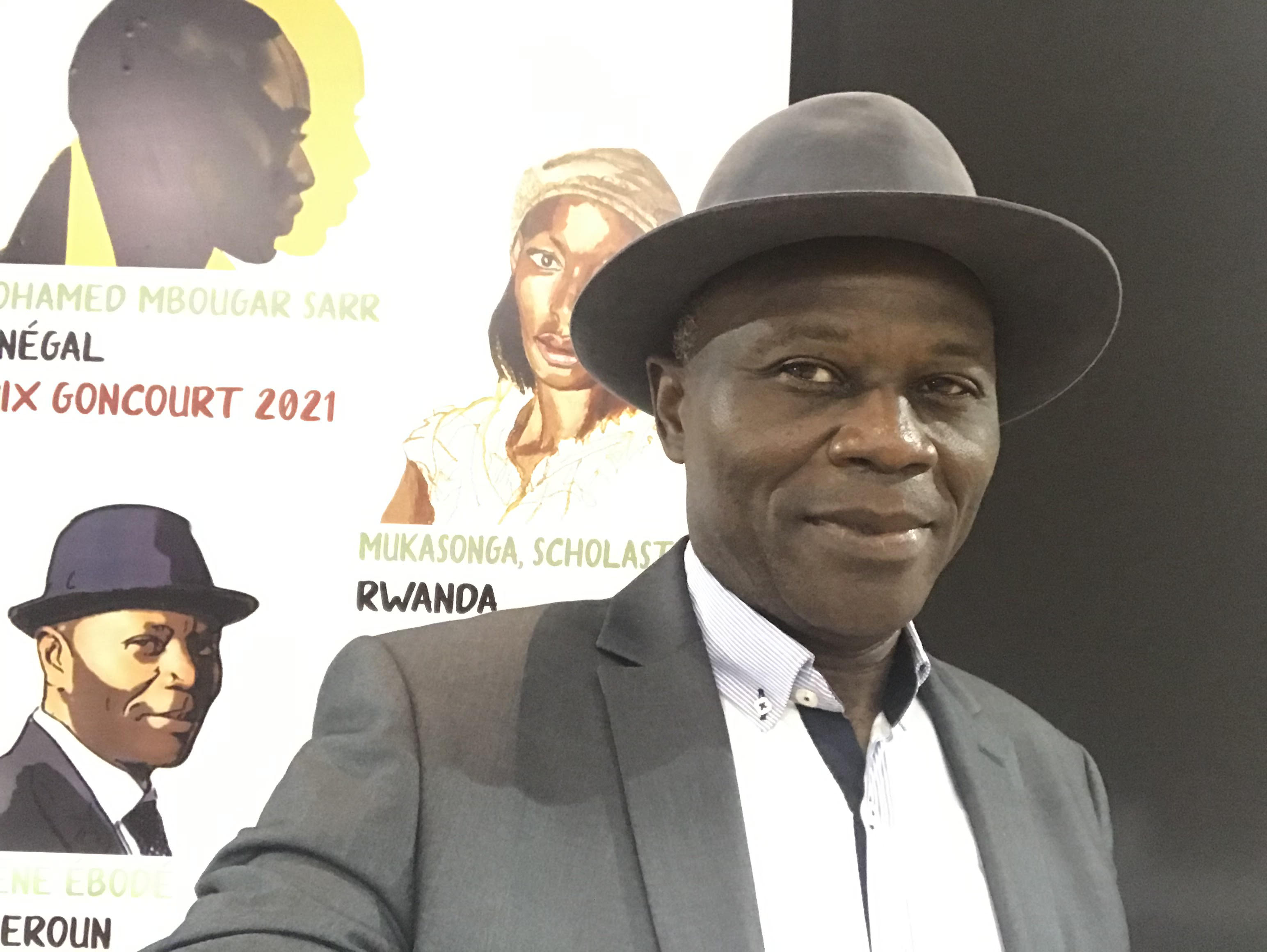
Afrique Destinations: In an article in Le Monde newspaper entitled "Three books that marked me"... by the Cameroonian novelist Eugène Ebodé", between Le Vieux Nègre et la Médaille, by Ferdinand Oyono and Au bonheur des limbes, by Mohamed Leftah, you mention Eugene Onegin, by Alexander Pushkin. Is it out of pure literary passion or because you are originally from Cameroon or know Chad from elsewhere. Especially since the Ancestors of Pushkin and therefore Pushkin himself by implication is partly from the banks of the Logone, between Chad and Cameroon...
Eugène Ebodé : Pushkin is the father of modern Russian literature and an extraordinary poet. Dieudonné Gnammankou, a Beninese historian, devoted a study to him in which I participated in 1999. Pouchkine is a poetic beacon. Its language is of crystal and its African world a powerful claim in Eugene Oneguine. His African and Cameroonian origins also play a role in the admiration I have for this prodigious writer, it's true. But first there is his language, his outline, his literary genius, his chivalrous side.
Afrique Destinations: Professor Eugène Ebodé, what is your latest novel Habiller le ciel about, which will be published on October 6 by Gallimard?
Eugène Ebodé : This novel pays homage to my mother and to women. My mother could neither read nor write, but she had developed a faculty of counting and negotiation that amazed me when I was young and ran a wholesale business. She's the one who got me first pushed out of the stadiums before inviting me to hold the school as a privileged space for regeneration through knowledge. Not simply seen as a collection of raw data, but a requirement for transmission and re-enchantment of collective destinies. She imposed on me a taste for books so that I knew how to decipher them and accomplish by delegation a revenge on the cursed fate that had been hers and that of her fellows: the illiterate. She dreamed that I would write about it and that I, in turn, would offer books, when the time came, to the people of readers. I obeyed his dreams which sometimes took on the appearance of a dictate. She was terrible, Mother, when she wanted something. I had to sacrifice my balloon desires for the scrolls and then the writing of the books. You will be surprised by Dressing the Sky (Habiller le ciel), because my mother intervenes there, from the Realm of the dead where she now resides and from which she continues to shower me with her recommendations. She can't help herself, even dead, from "cornering" me to crucify me with her injunctions. It's amazing!
Afrique Destinations: If you were asked of all your books, which three are the dearest to your heart and why, what would you say?
Eugène Ebodé : The Three? Impossible ! choose from the last five and you will see that it will be difficult for you to choose between: The Rose in the Yellow Bus (Gallimard, 2013) (La Rose dans le bus jaune (Gallimard, 2013), Sovereign Magnificent (Gallimard 2014) (Souveraine Magnifique (Gallimard 2014), The Balcony of God (Gallimard, 2019) Le Balcon de Dieu (Gallimard, 2019), Burning was Picasso's gaze (Gallimard, 2021) (Brûlant était le regard de Picasso (Gallimard, 2021), Dressing the sky (Gallimard, 2022) Habiller le ciel (Gallimard, 2022). Read them in any order you want, and you'll tell me about them.
Afrique Destinations: I would be remiss if I ended this interview without mentioning the memory of a mutual friend, I want to talk about the French journalist and writer Pierre Cherruau, author of several books including the frames, who left us suddenly on August 19, 2018 in Bordeaux, the very day before his forty-ninth birthday. What memory do you keep of the journalist and writer Pierre Cherruau that you knew?
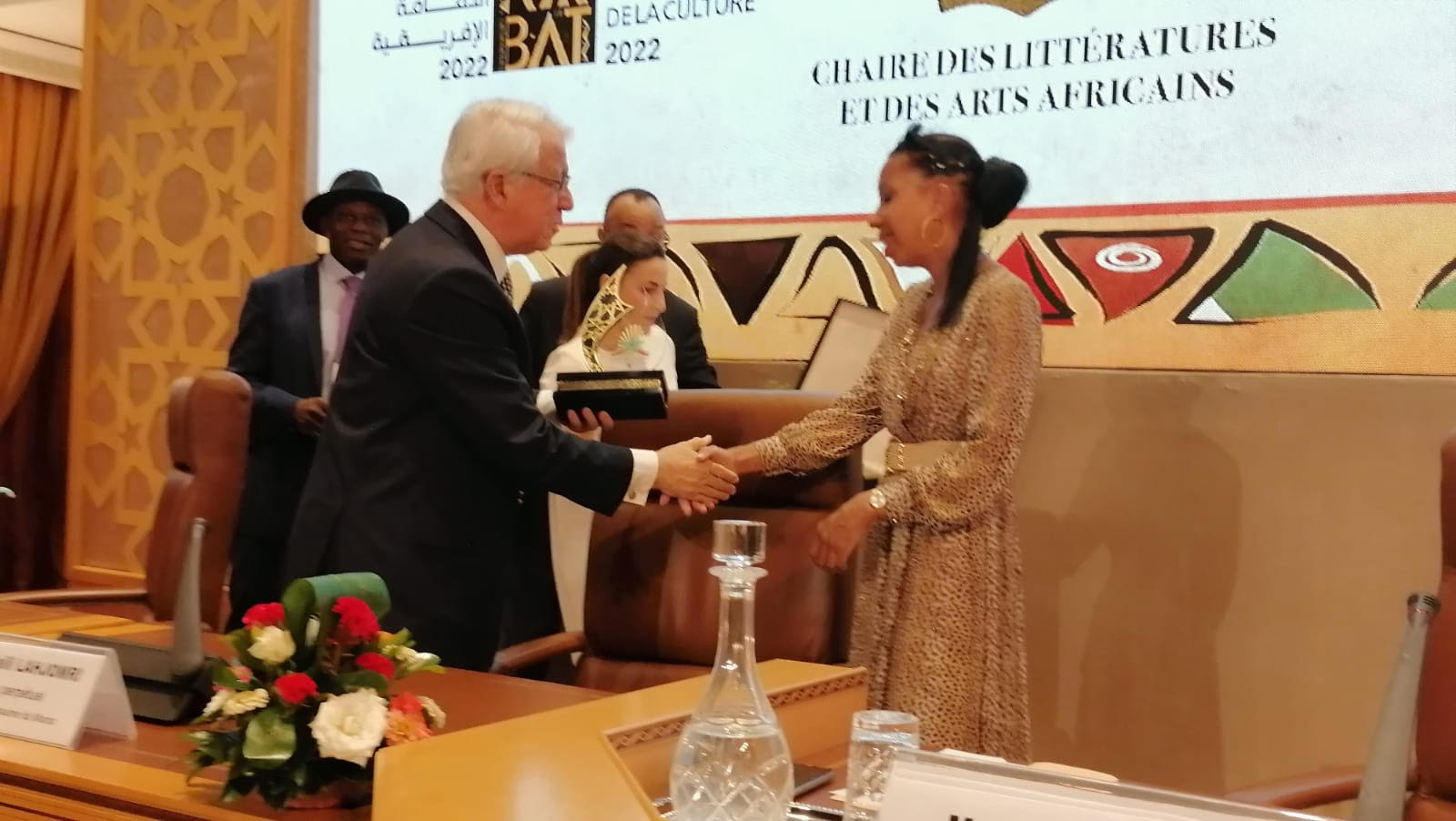
le Trophée spécial de l’Académie du Royaume du Maroc lors du colloque
sur la Famille organisé par la Chaire des littératures et des arts africains.
Eugène Ebodé : Pierre looked at the world from Africa and fled the Western morgue. For him, humans were backed by a single strain: the African. It was for him the point of fraternal convergences. We miss him a lot, but he left indelible traces in hearts and thoughts. Senegal was a land of adoption. We have just experienced some very beautiful moments at the Academy of the Kingdom of Morocco with a sumptuous colloquium on the theme of "The family seen as a labyrinth or a metaphor". Senegal was represented there by fine university figures: Professor Pape Massène Sène and Dr Coudy Kane from Cheikh Anta Diop University. The fabulous writer, Marie NDiaye, Prix Goncourt 2009, was also present. She also received the Special Trophy presented to her by Professor Abdeljalil Lahjomri, Permanent Secretary of the Academy of the Kingdom of Morocco. A capital moment in a city, Rabat, African Capital of Culture and the Islamic World in 2022!
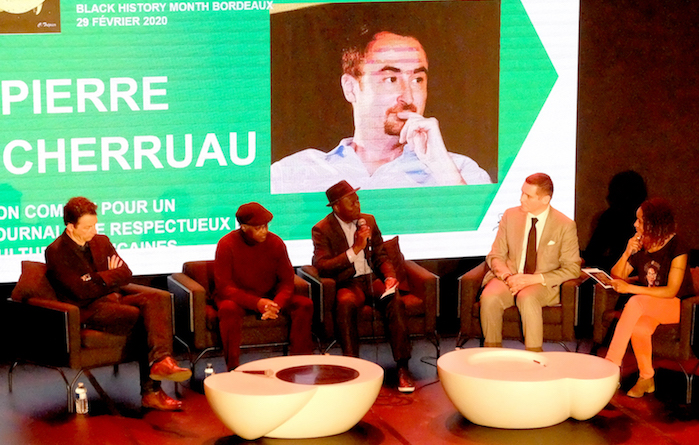
Afrique Destinations: And if you were asked if you have a message to end this interview, what would you say?
Eugène Ebodé : That Pierre Cherruau and my mother and other former humans must be very sad at the spectacle of the world which pursues the logic of compartmentalization and segregation when there are no longer any Whites, Blacks or Yellows when , after death, one returns to the state of pure spirit. We then flit about freely, without a passport or vaccination record, in this other vast and invisible universe which is called eternity plus a day... But we must never hasten our steps towards this state, but take our time and prepare as an honest man here below, to be even better in the stars. This is my mother's lesson in Dressing the Sky (Habiller le ciel).
Interview by Marcus Boni Teiga
*This article has been translated from French into English by Marcus Boni Teiga



